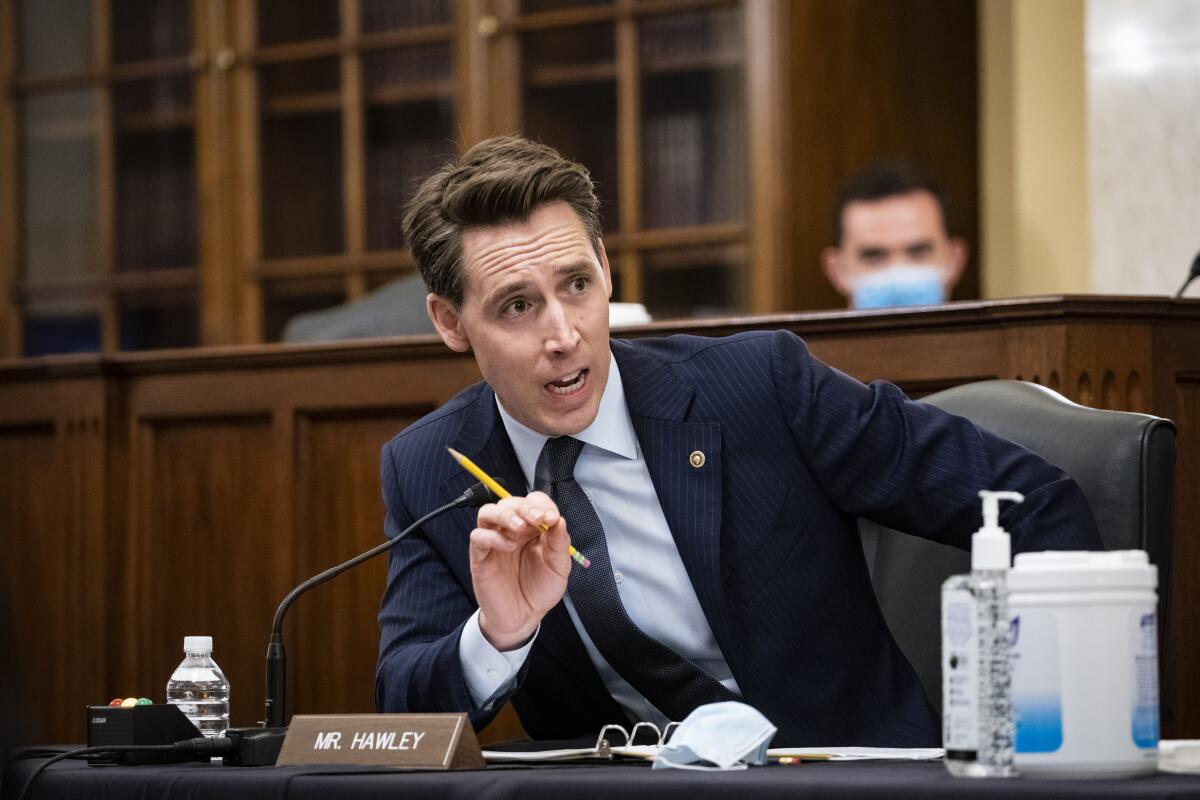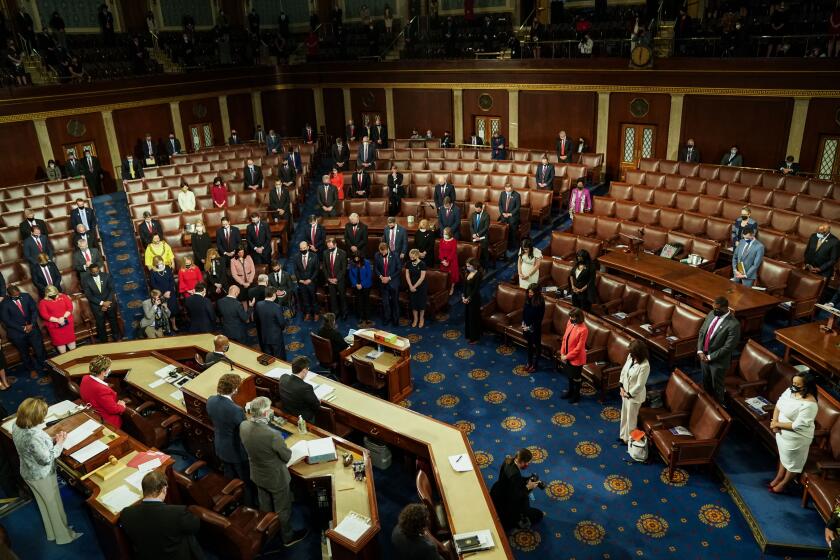Column: Ted Cruz and Josh Hawley are torching the Constitution to further their own presidential ambitions

In 1783, Russiaās Prince Grigory Potemkin, in an effort to dazzle Empress Catherine the Great, is said to have erected facades that looked like beautiful houses along her route when she visited his province. Historians have cast doubt on the tale, but the term āPotemkin villageā has lived on, coming to mean a false front intended to impress the gullible.
This week in Congress, weāll see a novel application of the concept: a Potemkin coup dāetat ā an elaborate farce constructed to convince pro-Trump voters not only that the presidential election was rigged (it wasnāt), but that the presidentās loyalists on Capitol Hill are mounting a heroic attempt to overturn it.
Even the ringleaders of the drive to block Joe Bidenās electoral votes from being counted know their proposals are doomed to fail. The Democratic House of Representatives stands in the way ā and so does a bipartisan majority in the Republican-led Senate.
So why are dozens of House members and more than 10 senators expected to challenge electoral votes that have been certified by the states?
The House and Senate meet Wednesday to receive and announce the results of the 2020 election, and some Republicans will try to challenge them. Hereās why they will fail.
Never mind that the Constitution doesnāt give Congress the power to reject electoral votes submitted by the states. The challenge is an irresistible opportunity to pander to President Trump and ā more importantly ā to his most zealous followers, who will be a powerful force in Republican primary elections in 2022 and 2024.
The two GOP senators leading the drive to block Bidenās election, Ted Cruz of Texas and Josh Hawley of Missouri, know that their efforts are likely to āgo down like a shot dog,ā as another Republican senator put it.
They know Trumpās spurious claims of election fraud went nowhere in the courts, even when they came before judges the president appointed.
Cruz and Hawley also know that what they are proposing would violate the Constitution. Both brag of their education as constitutional lawyers ā Cruz at Harvard, Hawley at Yale.
But both harbor unconcealed ambitions of running for president, and both want the support of Trumpās voters. So they are competing in a frantic show of fealty to the increasingly erratic president ā no small trick for Cruz, who quite accurately called Trump āa pathological liarā when he ran against him in 2016.
If Cruz and Hawley challenge the electoral votes submitted by swing states on Wednesday, they will be staging acts of performance art ā a show to convince Trump voters that they are the presidentās rightful heirs.
In the service of their ambitions, they appear willing to touch off a constitutional crisis. That isnāt merely cynical; itās criminally cynical.
Donāt take it from me; listen to their Republican colleagues.
āLetās be clear what is happening here: We have a bunch of ambitious politicians who think thereās a quick way to tap into the presidentās populist base,ā Sen. Ben Sasse (R-Neb.) said last week. āAdults donāt point a loaded gun at the heart of legitimate self-government.ā
āHas ambition so eclipsed principle?ā lamented Sen. Mitt Romney (R-Utah).
OK, Sasse and Romney have never been Trumpites. But Sen. Tom Cotton (R-Ark.) has, and he thinks blocking Bidenās electoral votes is a terrible idea, too.
āIf Congress purported to overturn the results of the Electoral College, it would not only exceed [its] power, but also establish unwise precedents,ā Cotton said in a written statement.
Exactly. The precedent Cruz and Hawley want to set is that any party that loses a presidential election will now feel free ā perhaps even duty-bound ā to try to block its certification in Congress.
For Republicans who are paying attention, thatās not just an airy legal theory. As a group of GOP House members pointed out this week, Republican presidential candidates have won the national popular vote only once in the last eight elections spanning 28 years. They need the electoral college to win; thatās how Trump made it to the White House in 2016.
Plenty of Democrats grumbled about Trumpās victory without a plurality four years ago, but they didnāt attempt to override the Constitution. In 2005, one Democratic senator and one House member objected to the reelection of President George W. Bush ā but unlike Trump today, Democratic presidential candidate John F. Kerry disavowed their effort, and it quickly collapsed.
If a party with a congressional majority can overturn presidential election results at will, thatās a quick way to turn a democracy into a single-party state.
So when 2024 arrives, voters should remember Cruz, Hawley and those who join their Potemkin coup this week. They may succeed in proving themselves as loyal Trumpists ā but along the way, they are also revealing themselves as would-be autocrats.
More to Read
Get the L.A. Times Politics newsletter
Deeply reported insights into legislation, politics and policy from Sacramento, Washington and beyond. In your inbox three times per week.
You may occasionally receive promotional content from the Los Angeles Times.












